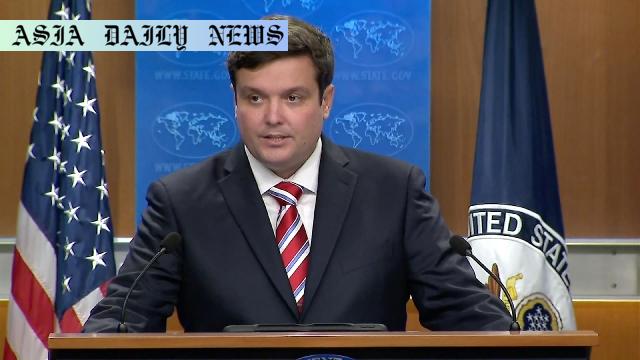visa sanctions: The United States announces visa sanctions on Palestinian Authority officials for supporting terrorism and inciting violence.
- The US imposed visa sanctions on Palestinian Authority and Palestinian Liberation Organization officials.
- The sanctions aim to penalize incitement of violence and internationalizing the Israel-Palestine conflict.
- The move shows US’s strong support for Israel amid ongoing Gaza conflict.

US Visa Sanctions Against Palestinian Officials: An Assertive Move
The United States dealt a significant diplomatic decision with its recent announcement of visa sanctions targeting Palestinian Authority officials and members of the Palestinian Liberation Organization (PLO). This bold step intends to penalize these groups for alleged actions such as supporting terrorism and glorifying violence, particularly in educational materials. Furthermore, the US government points to efforts by these groups to internationalize their conflict with Israel by pursuing cases in the International Criminal Court (ICC), labeling such moves as counterproductive and escalating tensions in the region.
Details regarding specific individuals impacted remain unclear. Questions loom about whether Palestinian Authority President Mahmoud Abbas, along with other senior officials, will face travel bans ahead of highly significant events such as the United Nations General Assembly scheduled for September. Historically, the United States, as the UN’s host nation, has committed to providing entry rights for all representatives of member states to attend official meetings. This set of sanctions poses a test for these agreements.
US Stance Amid Rising International Divides
This decision underscores the current American administration’s unyielding support for Israel amidst intensifying geopolitical divides. Other major nations such as France, Canada, and the United Kingdom are reportedly exploring formal recognition of the State of Palestine, which could place them on a divergent path with the US. Such discord among Western allies reflects the increasingly fragmented approach towards the decades-long Israel-Palestine conflict. The sanctions announcement highlights stark differences in strategy, emphasizing punitive measures over potential reconciliation efforts.
Meanwhile, relentless violence continues to unfold across the Gaza Strip as no substantial solutions emerge. The US government’s actions stress its broader strategy of aligning closely with Israel’s security and diplomatic priorities, yet they also risk deepening regional resentment and failing to bring any closer resolution to the enduring devastation in Gaza.
Potential Implications and Broader Interruptions
The implications of this announcement could stretch beyond mere political posturing. If enacted broadly or extended to prominent Palestinian leadership, these travel bans might disrupt ongoing diplomatic efforts, further isolating the Palestinian Authority and complicating peace negotiations. Additionally, educational reforms, alleged incitement campaigns, and the sanctity of international conflict resolutions will come under intense scrutiny.
This shifting diplomatic dynamic raises broader questions about the feasibility and morality of unilateral penalties when global stakeholders call for unity in resolving entrenched conflicts. Moves such as this may draw condemnation from other nations, particularly those actively engaging with Palestinian leaders or advocating for equitable solutions in the Israel-Palestine saga.
Towards a Resolution?
While the United States’ decision starkly contrasts many other nations involved in Middle Eastern diplomacy, it cannot detract from the broader crux of the ongoing crisis: perpetuation of human suffering and territorial disputes in Gaza. With no end to the violence insight, the latest sanctions may speak volumes about power dynamics but do little to foster constructive, prolonged peace.
For resident populations on both sides, sustained international squabbling often brings immeasurable human costs. Durable solutions may only emerge when discussions grow to incorporate regional aspirations, fair assessments, and shared objectives among immediate stakeholders—all factors visibly clouded amidst unilateral moves like these recent sanctions.



Commentary
The Weight of Sanctions in A Divided World
The recent US announcement of visa sanctions targeting Palestinian officials demonstrates the increasing fragmentation seen in international diplomacy. This decision, which embraces punitive measures over reconciliatory efforts, reveals a notable commitment by the US administration to stand with Israel amidst ongoing conflict. However, as with all significant moves of this magnitude, its implications and broader challenges are worth considering.
Unilateral Actions: Problematic or Practical?
While the sanctions may act as a deterrent against actions deemed harmful to Israel or international norms, they also risk catalyzing further division between Western powers. As other influential countries such as the UK, Canada, or France lean towards recognizing Palestine as a state, the lack of unified strategy could hinder comprehensive resolutions to the Israel-Palestine conflict. Unilateral actions often create not only diplomatic ripples but also deepen on-ground uncertainties among affected populations.
Diplomatic Channels or Barriers?
This announcement raises valid concerns regarding the ongoing fragility of peace-building processes in the Middle East. Travel sanctions, in particular, might obstruct crucial opportunities for dialogue by isolating key voices from crucial international fora. Intentions of fostering accountability must somehow balance punishment with shared pathways to productive discourse, without exacerbating generational traumas or collective suffering linked intrinsically to violence.
What Comes Next?
While America’s unwavering support for Israel is consistent, the shades of this latest development speak volumes about its diplomatic endgame. Yet, tactical gains can’t decisively outweigh systemic inequities that fuel instability across the Gaza Strip. The world continues to wait not only for declarations but measurable actions toward achievable and sustainable peace.